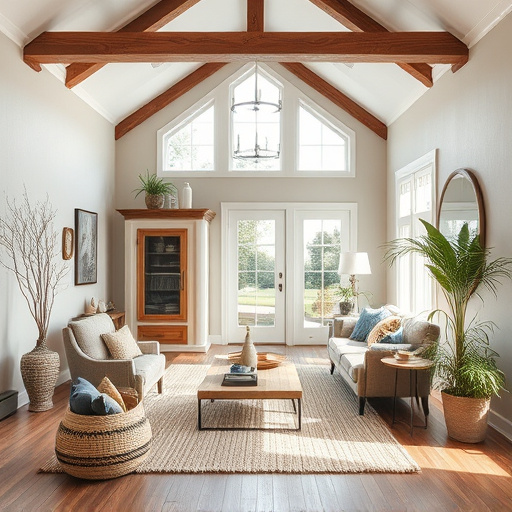2024 heralds a pivotal shift towards eco-friendly and sustainable home renovations, particularly in kitchen design. Homeowners are increasingly opting for green materials like recycled glass, bamboo, reclaimed wood, and sustainably sourced stone to reduce their ecological footprint while enhancing the visual appeal of their interiors. These materials also improve indoor air quality by emitting fewer volatile organic compounds. The trend includes integrating Energy Star-rated appliances that are energy efficient and smart technology capable of managing energy consumption precisely. Renewable energy sources, such as solar panels, are being incorporated into kitchen designs, further emphasizing the commitment to sustainability. Kitchen renovations are also becoming more resource efficient with upcycling practices, ensuring longevity and minimizing waste. Water conservation measures like low-flow faucets and smart dishwashers are standard, alongside systems for recycling greywater. Biophilic design principles are being applied to create kitchen spaces that connect with nature, promoting well-being and health through natural materials and abundant sunlight. The use of locally sourced, sustainable materials not only supports local economies but also aligns with a broader sustainability ethos, underscoring the importance of environmental stewardship in home renovations.
2024 heralds a new wave in home renovations, particularly within kitchen spaces. This year’s sustainable kitchen remodel trends focus on eco-conscious design and functionality. From integrating eco-friendly materials to embracing energy efficiency and smart technology, the kitchen evolves as a testament to our commitment to the planet. Upcycling and circular economy principles challenge traditional disposability, emphasizing sustainability. Water conservation becomes a key feature in modern kitchen designs, alongside biophilic design that fosters a harmonious environment. Local sourcing of materials also rises to the forefront, reflecting a global shift towards responsible home renovations.
- Embracing Eco-Friendly Materials in Home Renovations for Sustainable Kitchen Designs
- Energy Efficiency and Smart Technology Integration in Home Renovations
- Circular Economy and Upcycling in Kitchen Remodels: A Shift from Traditional Disposability
- Water Conservation Features in Modern Kitchen Renovations
- Biophilic Design Principles for a Harmonious Kitchen Environment
- The Rise of Local and Sustainable Material Sourcing in Home Renovations
Embracing Eco-Friendly Materials in Home Renovations for Sustainable Kitchen Designs

2024 is set to see a significant uptick in the incorporation of eco-friendly materials into home renovations, particularly within sustainable kitchen designs. Homeowners are increasingly recognizing the importance of minimizing their environmental footprint, and this ethos is permeating their renovation choices. Eco-conscious materials such as recycled glass, bamboo, reclaimed wood, and sustainably sourced stone are becoming more mainstream. These materials not only reduce waste but also offer a unique aesthetic that can serve as a conversation piece within the home. The use of these sustainable materials in kitchen countertops, cabinetry, and flooring contributes to a healthier living environment by off-gassing fewer volatile organic compounds compared to traditional materials. Moreover, the durability of these eco-friendly options often means they require less maintenance over time, further reducing the environmental impact associated with cleaning products and replacement costs.
In the realm of home renovations, the shift towards sustainability is also evident in the energy efficiency of kitchen appliances. Homeowners are opting for Energy Star-rated models that consume less electricity and water. This not only aligns with a broader commitment to environmental stewardship but also translates into cost savings over the long term. The integration of smart technology within these appliances allows for better monitoring and management of energy use, further enhancing the sustainability of kitchen renovations. As the trend towards eco-friendly home renovations continues to gain traction, we can expect to see even more innovative solutions that align with the principles of sustainability, making 2024 a pivotal year for green kitchen designs.
Energy Efficiency and Smart Technology Integration in Home Renovations

In 2024, home renovations with a focus on energy efficiency and smart technology integration are at the forefront of sustainable kitchen remodeling trends. Energy efficiency is no longer a luxury but a necessity, as homeowners seek to reduce their carbon footprint and lower utility bills. This year, the adoption of energy-star rated appliances has surged, with induction cooktops and energy-efficient lighting leading the charge. These appliances not only conserve electricity but also enhance cooking performance and longevity. Moreover, the trend towards incorporating smart home technology is reshaping kitchen designs. Homeowners are installing smart thermostats, energy monitors, and automated systems that optimize heating, cooling, and lighting based on usage patterns and real-time environmental data. These intelligent systems not only contribute to a more sustainable living environment but also offer homeowners greater control over their energy consumption and significant cost savings in the long run.
The integration of smart technology within kitchen renovations extends beyond mere convenience; it represents a paradigm shift towards a smarter, more efficient use of resources. For instance, smart faucets that monitor water flow to prevent wastage and smart ovens that can be preheated remotely via a smartphone app are becoming increasingly popular. Additionally, the use of renewable energy sources, such as solar panels, is being seamlessly integrated into kitchen designs. These advancements underscore the commitment to sustainability within the realm of home renovations, positioning 2024 as a pivotal year for environmentally conscious and technologically advanced living spaces.
Circular Economy and Upcycling in Kitchen Remodels: A Shift from Traditional Disposability

2024 is set to be a pivotal year for home renovations, with an emphasis on sustainability taking center stage in kitchen remodels. A significant trend emerging is the adoption of circular economy principles, which prioritize resource efficiency and waste reduction over traditional disposability models. This approach is characterized by the design and construction of kitchens that are not only energy-efficient but also have a lifecycle that can be extended through upcycling and repair. Upcycling in particular stands out as an innovative practice within this trend, where old materials and appliances are repurposed into new, functional elements within the kitchen space. This not only diverts waste from landfills but also infuses the kitchen with unique character and story, reflecting a commitment to environmental stewardship and creative reuse.
Homeowners are increasingly recognizing the value of investing in renovations that align with circular economy ideals. By choosing materials that are either recycled or easily recyclable, and by opting for appliances designed with end-of-life considerations in mind, these homeowners are future-proofing their kitchens. The shift from a linear ‘take, make, dispose’ model to one focused on the continuous use of resources is not only economically sound but also environmentally responsible. It represents a cultural change where sustainability and longevity are at the forefront of home renovations, particularly within the kitchen space, which is often seen as the heart of the modern home. This trend towards circularity in kitchen remodels is indicative of a broader societal shift towards valuing long-term resource management and the creation of spaces that are both beautiful and built to last.
Water Conservation Features in Modern Kitchen Renovations

2024’s sustainable kitchen remodels prioritize water conservation through innovative features that reflect a commitment to eco-conscious living within home renovations. Advanced faucets equipped with low-flow aerators are becoming standard, significantly reducing the amount of water used for washing dishes and hands without compromising performance. These fixtures, along with smart dishwashers and laundry units designed to minimize water consumption, ensure that every drop is used efficiently. Additionally, the integration of water recycling systems within kitchen designs allows for the reuse of greywater for irrigation or flushing toilets, further lessening the environmental footprint of household water usage. By incorporating these features, homeowners are not only adhering to sustainable practices but also potentially reducing their utility bills, making water conservation a smart choice for modern kitchen remodels in 2024 and beyond.
In line with global sustainability goals, the latest trends in kitchen renovations emphasize the importance of integrating water-saving technologies. These advancements not only align with the principles of eco-friendly home renovations but also offer long-term cost savings and environmental benefits. Homeowners are increasingly opting for permeable surfaces, rainwater harvesting systems, and drought-resistant landscaping as complementary measures to the water conservation features within their kitchens, creating a cohesive and sustainable approach to home management. The adoption of these practices signifies a shift towards a more conscientious and responsible way of living, highlighting the role of home renovations in promoting sustainability.
Biophilic Design Principles for a Harmonious Kitchen Environment

In the realm of home renovations for 2024, biophilic design principles are playing a pivotal role in reshaping kitchen spaces to be more harmonious and connected with nature. This year’s sustainable kitchen remodels are not just about aesthetics; they’re about creating an environment that nurtures well-being. By integrating natural elements such as plants, wood finishes, and ample natural light, these kitchens foster a living space that promotes relaxation and productivity. Homeowners are increasingly opting for materials that are not only visually appealing but also sustainable and durable, reducing their environmental footprint while enhancing the longevity of their kitchens. The use of eco-friendly paints and finishes free from harmful VOCs (volatile organic compounds) is another aspect of biophilic design that supports indoor air quality, contributing to a healthier living environment.
Furthermore, in the pursuit of sustainability, kitchen layouts are being thoughtfully designed to maximize natural ventilation and lighting, minimizing the need for artificial energy sources. This not only reduces energy costs but also creates a space that feels more open and connected to the outdoors. Appliances with high energy efficiency ratings are becoming standard, as homeowners seek to integrate technology that aligns with their sustainability goals. The seamless blend of functionality, design, and nature in biophilic kitchen designs not only enhances the aesthetic appeal but also creates a space that promotes mental and physical health, making it an essential consideration for those looking to undertake home renovations with a focus on well-being and environmental stewardship.
The Rise of Local and Sustainable Material Sourcing in Home Renovations

2024 is set to see a marked increase in the incorporation of local and sustainable materials in home renovations, reflecting a broader shift towards eco-conscious living. Homeowners are increasingly recognizing the environmental impact of their choices, leading to a preference for locally sourced building materials that reduce transportation emissions. This trend extends beyond simply selecting materials with lower carbon footprints; it involves a holistic approach to sustainability, where the lifecycle of materials is considered, ensuring that the resources used are not only responsibly harvested but also have a secondary use or are recyclable at the end of their primary life.
The benefits of this approach are multifaceted: it supports local economies by providing a market for regional craftsmanship and products, it reduces the environmental footprint associated with long-distance transportation, and it often results in unique and high-quality materials that can give a home a distinctive character. Additionally, by opting for sustainably sourced materials, homeowners are contributing to the conservation of natural habitats and the preservation of biodiversity. This shift towards local and sustainable material sourcing in home renovations is not just a fleeting trend but a significant change that aligns with the values of many consumers who prioritize environmental stewardship in their homes.
2024 is shaping up to be a pivotal year for sustainable kitchen remodels, with home renovations reflecting a significant shift towards eco-conscious practices. This year’s top trends highlight a commitment to using eco-friendly materials, integrating smart technology for energy efficiency, and embracing the circular economy through upcycling. Homeowners are also focusing on water conservation features and incorporating biophilic design principles to create a more harmonious kitchen environment. Additionally, the preference for locally sourced materials in home renovations is gaining momentum, emphasizing the importance of supporting local economies while reducing the carbon footprint. These trends underscore a transformative approach to kitchen remodeling that not only enhances the functionality and aesthetics of the space but also contributes positively to the environment. Homeowners looking to update their kitchens in the coming year have an array of sustainable options that balance practicality with the imperative for a greener future.



